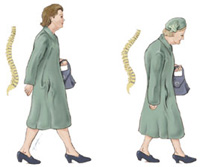Depo-Provera has been used as an injectable form of contraception, but the manufacturer (Pfizer Canada Inc.) has sent out warnings to physicians about some quite serious side effects. New data have shown that after two years of use significant bone density loss can be seen.
What is more alarming is the fact, that this loss does not seem to be fully reversible, even if the medication is stopped. The effect is bad enough for adults, but it becomes even more alarming should adolescents receive the product: at a time when they should build their bone density, they would be experiencing the problem of bone density loss!
The amounts of bone mineral density is not insignificant: a controlled clinical study showed that women, who received the medication for 5 years showed a decrease of bone density in the spine and hip of 5 to 6 %. If the drug was stopped, there was a partial recovery of the loss, but the longer the drug was used, the less favorable was the recovery of bone density.
There has been some awareness in the past, that loss of bone density could be a risk in the use of Depo-Provera, but there was the thought that all would be well after discontinuing the medication.
This however is not the case after the new research data, and it should caution women to stay away from this form of birth control, if they are interested in maintaining good bone health.
More information about osteoporosis: http://nethealthbook.com/arthritis/osteoporosis/
Reference: The Medical Post, December 7, 2004, page4
Comment on Dec. 7, 2012: Depot Provera belongs into the progestin type hormone equivalents of progesterone (= the natural ovarian hormone). A young female who has normally functioning ovaries has strong bones as both estrogen and progesterone stimulate bone formation by stimulating receptors on the osteoblasts, cells that make new bone. Artificial hormone products like the progestins do not stimulate these receptors, they may even block them. So, women should stay away from Depot-Provera and other Big Pharma contraceptives, as they will contribute to osteoporosis. On the other hand when a woman enters the menopause, she requires full replacement with bio-identical estrogen/progesterone creams to stimulate bone formation and to prevent osteoporosis. There is still a lot of misinformation around in the public, often because of misinforming “infomercials” from Big Pharma.
Last edited October 27, 2014






